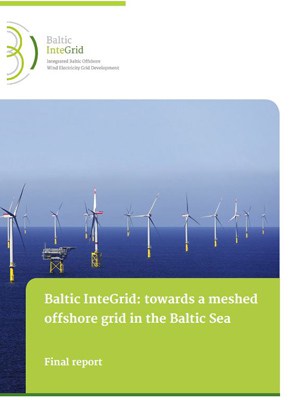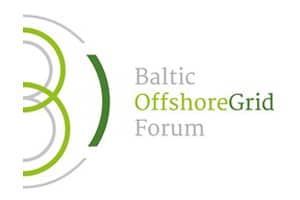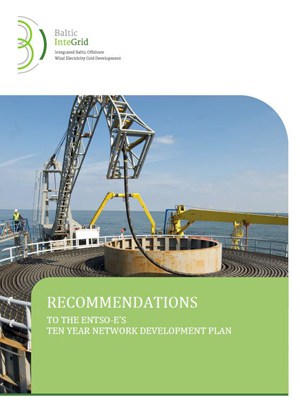Baltic InteGrid
Because the Baltic Sea is shallow, has low wave heights, and neglectible tides, it provides very good prerequisites to install large offshore wind power devices. The full potential of offshore wind power can be exploited if the countries around the Baltic Sea established large transnational meshed offshore wind grids based on the same standards and methodology.
While today, offshore wind parks are typically connected to land individually, and national grids have few large connections, a meshed grid connects several wind parks from different countries at sea with few connections to land in the different countries. In such a meshed grid energy losses for transportation are considerably lower. Thus, few large meshed grids would make use of electricity produced offshore much more efficiently than current networks in place and and they would deliver more stability and security in energy supply to all countries connected.
Budgets
in numbers
-
3.95MillionTotal
-
3.04MillionErdf
-
0.00MillionEni + Russia
-
0.00MillionNorway
Achievements
Baltic InteGrid has framed and coined the debates around offshore wind energy development in the Baltic Sea region with excellence in research and professional dissemination efforts, laying the ground for further exploitation of the project results by key actors.
The right players are on board
The project created a knowledge and cooperation platform in which all the relevant stakeholders from the offshore wind energy supply chain meet, exchange and plan their cooperation. The number of stakeholders who can play a decisive role in such a large infrastructure project is limited. There is maybe a dozen companies who would be able to operate such transmission systems and only larger energy suppliers have experience in building and operating wind parks in an offshore environment. Baltic InteGrid has gotten most of them onboard. However, at the core of the cooperation platform are the authorities of all countries involved who are responsible for designating suitable offshore areas and issuing construction permits. To make the circle complete in terms of knowledge needed, Baltic InteGrid involved renowned research institutes and several companies known for producing reliable wind mill components.
A common vision based on sound calculations and planning
Based on the joint expertise of practitioners and scientists from different disciplines from in total seven countries, the project calculated a potential of 35 GW by 2050. In 2018, only 2.2 GW were installed. The project partners elaborated a common vision of what such a grid could look like and put down a plan that defines the necessary steps and procedures to plan, finance, implement and operate such a meshed offshore wind grid. The concept was tested and verified in two pre-feasibility studies covering a potential meshed grid between Poland-Sweden-Lithuania and Germany-Sweden-Denmark.
Good prospects for a joint offshore electricity grid
By firing up an expert discussion about a joint offshore electricity grid in the Baltic Sea, EUR 3.04 million from the European Union brought the macro-region closer to removing one of the most important bottlenecks for the development of renewable energy sources in the Baltic Sea region. Picked up by the right players in the market, the research activities and knowledge exchange initiated by the project can initiate changes in policy, regulation, investment decisions, technological development and planning towards the Baltic Offshore Grid. By actively addressing powerful players, the results of Baltic InteGrid have already reached influential organisations, e.g. the European Network of Transmission System Operators for Electricity which consider the Baltic InteGrid vision in its Ten Year Network Development Plan. The results of BalticIntegrid are spread further through the project platform Capacity4MSP.
Outputs
High Level Concept for the Baltic Offshore Grid

Baltic Offshore Grid Forum

Recommendations to the Ten-Year Network Development Plan (TYNDP) on the development of a Baltic Offshore Grid

Project Stories
-
29.03.2021
Cooperation as the key to a climate-neutral Baltic Sea region
A common challenge for the countries in the Baltic Sea region is how to produce green and climate-neutral energy. In fact, as much as 75% of the EU greenhouse gas emissions still come from energy use and production. Cooperation and sharing good practices in Interreg projects, such as LowTEMP, Baltic Integrid and Area 21, can be a game-changer in accelerating the energy transition in the region.Read full story -
06.01.2020
Interview: Exploiting offshore wind energy in the Baltic Sea region
The Baltic Sea region has great potential to generate offshore wind energy, but offshore grid development poses a major obstacle. The Interreg project Baltic InteGrid looked into meshed electricity grids, i.e. interconnecting offshore wind farms in order to achieve cost advantages and make more efficient use of maritime space. Thilo Krupp from the German Offshore Wind Energy Foundation explains results and experiences from the project.Read full story
Partners
Institute for Climate Protection, Energy and Mobility
- TownBerlin
- RegionBerlin
- CountryGermany
- RepresentativeAnika Nicolaas Ponder
- Phone
- E-Mail
- Web
Foundation for Sustainable Energy
- TownWarzawa
- RegionMiasto Warszawa
- CountryPoland
- RepresentativeMariusz Wójcik
- Phone
- E-Mail
- Web
Rostock Business and Technology Development
- TownRostock
- RegionRostock, Kreisfreie Stadt
- CountryGermany
- RepresentativeGert Proba
- Phone
- E-Mail
- Web
Technical University of Denmark
- TownKgs. Lyngby
- RegionØstsjælland
- CountryDenmark
- RepresentativeLise-Lotte Pade
- Phone
- E-Mail
- Web
Energy Agency for Southeast Sweden
- TownVäxjö
- RegionKronobergs län
- CountrySweden
- RepresentativeSarah Nilsson
- Phone
- E-Mail
- Web
German WindGuard GmbH
- TownVarel
- RegionFriesland (DE)
- CountryGermany
- RepresentativeAnna-Kathrin Wallasch
- Phone
- E-Mail
- Web
Maritime Institute in Gdańsk
- TownGdańsk
- RegionGdański
- CountryPoland
- RepresentativeJoanna Przedrzymirska
- Phone
- E-Mail
- Web
Foundation Offshore Windenergy
- TownVarel
- RegionFriesland (DE)
- CountryGermany
- RepresentativeDennis Kruse
- Phone
- E-Mail
- Web
Latvian Association of Local and Regional Governments
- TownRīga
- RegionRīga
- CountryLatvia
- RepresentativeElita Kresse
- Phone
- E-Mail
- Web
Aalto University
- TownAalto
- RegionHelsinki-Uusimaa
- CountryFinland
- RepresentativeAri Ekroos
- Phone
- E-Mail
- Web
University of Tartu
- TownTartu
- RegionLõuna-Eesti
- CountryEstonia
- RepresentativeHannes Veinla
- Phone
- E-Mail
- Web
Public institution Coastal Research and Planning Institute
- TownKlaipeda
- RegionKlaipėdos apskritis
- CountryLithuania
- RepresentativeNerijus Blažauskas
- Phone
- E-Mail
- Web
Lund University
- TownLund
- RegionSkåne län
- CountrySweden
- RepresentativeJörgen Svensson
- Phone
- E-Mail
- Web
Aarhus University
- TownAarhus
- RegionØstjylland
- CountryDenmark
- RepresentativeBirgitte Egelund Olsen
- Phone
- E-Mail
- Web
-
Project managerAnika Nicolaas PonderIKEM | Institute for Climate Protection, Energy and Mobility
-
Legal representativeSimon Schäfer-StradowskyInstitute for Climate Protection, Energy and Mobility
-
Financial managerHakan UrazREM · Consult
-
Communication managerAnika Nicolaas PonderIKEM | Institute for Climate Protection, Energy and Mobility



